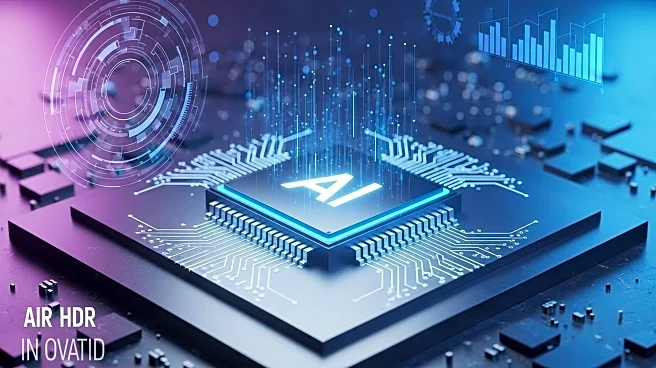What's Happening?
OpenAI has announced a strategic partnership with Broadcom to develop and deploy 10 gigawatts of custom AI accelerator hardware. These AI accelerator racks are set to be integrated into OpenAI's data centers and partner facilities from 2026 through 2029. The collaboration aims to enhance AI infrastructure by embedding OpenAI's frontier models and products directly into the hardware, thereby unlocking new levels of capability and intelligence. Although the financial terms of the deal were not disclosed, estimates suggest it could cost OpenAI between $350 billion and $500 billion. This partnership follows recent significant infrastructure deals by OpenAI, including a purchase of six gigawatts of chips from AMD and a $300 billion cloud infrastructure agreement with Oracle.
Why It's Important?
The partnership between OpenAI and Broadcom marks a significant development in the AI industry, emphasizing the growing importance of hardware in advancing AI capabilities. By designing custom chips, OpenAI can optimize its AI models and products, potentially leading to more efficient and powerful AI systems. This move could position OpenAI as a leader in AI infrastructure, influencing the direction of AI development and deployment. The collaboration also highlights the increasing investments in AI technology, which could drive innovation and competition among tech companies, impacting various sectors reliant on AI advancements.
What's Next?
The deployment of AI accelerator racks is scheduled to begin in 2026, with completion expected by 2029. As OpenAI integrates these custom hardware solutions, it may lead to further advancements in AI capabilities and applications. Stakeholders, including tech companies and investors, will likely monitor the progress and outcomes of this partnership closely. Additionally, the collaboration could prompt other companies to pursue similar partnerships to enhance their AI infrastructure, potentially leading to a wave of innovation and competition in the AI hardware market.
Beyond the Headlines
This partnership could have broader implications for the tech industry, particularly in terms of ethical considerations and regulatory challenges associated with AI development. As AI systems become more integrated into hardware, questions about data privacy, security, and ethical use of AI may arise. Furthermore, the collaboration could influence long-term shifts in how AI is developed and deployed, potentially setting new standards for AI infrastructure and capabilities.










